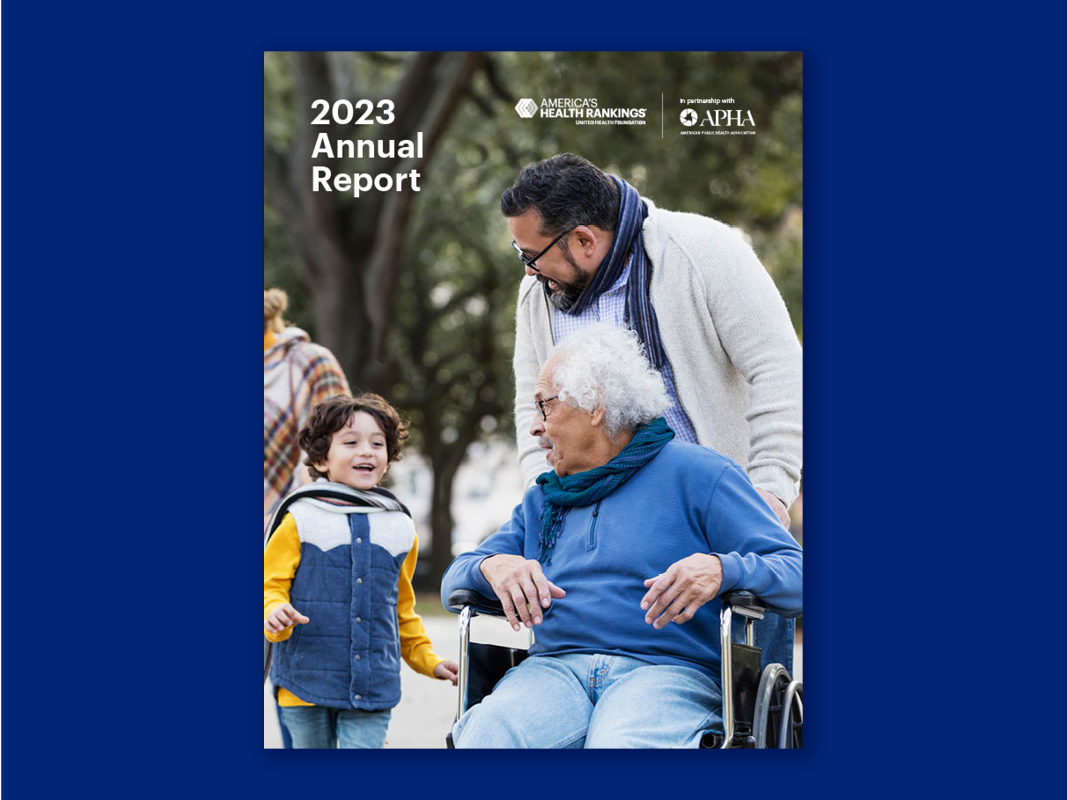Just released, the America’s Health Rankings 2023 Annual Report shows eight chronic conditions have reached the highest prevalence in the report’s history. These include arthritis, asthma, cancer, cardiovascular diseases (CVDs), chronic kidney disease (CKD), chronic obstructive pulmonary disease (COPD), depression and diabetes.
Produced by the United Health Foundation, in partnership with the American Public Health Association, the report provides the longest running state-by-state analysis of the nation's health. It is designed to guide action for improving health and well-being of communities, as well as spark timely discussions about solutions to some of the most urgent disparities. It provides a comprehensive look at the health of Americans across 87 measures of health from 28 data sources.
DIVE INTO THE DATA
Eight chronic conditions reached their highest levels since America’s Health Rankings began tracking them. Notably:
- Diabetes prevalence increased to 11.5% of the adult population, impacting nearly 31.9 million adults.
- Depression prevalence increased to 21.7% of the adult population, affecting nearly 54.2 million adults.
Stark disparities across nearly all demographic groups include:
- Chronic Obstructive Pulmonary Disease was 7.1 times higher among American Indian/Alaska Native adults than Asian adults.
- Cancer was 3.9 times higher among white adults than Asian adults.
- Depression was 2.4 times higher among adults who identified as LGBQ+ than straight adults.
- When compared to white adults with diabetes, Hispanic and Black adults were 2.1 times and 1.8 times more likely to have uncontrolled blood sugar levels, as indicated by the A1c test.

“The America’s Health Rankings Annual Report reveals an urgent need to address the increase in chronic conditions our nation is facing. I urge you to take a closer look at this report’s data and use it to help tailor public health interventions that address these worrying trends. It’s important for all of us to continue to share these findings to spark dialogue and solutions to our nation’s most pressing public health challenges.”
Dr. Rhonda Randall | Executive Vice President and Chief Medical Officer, UnitedHealthcare Employer & Individual
“More and more Americans are living with multiple chronic conditions – many of which require complex management even after diagnosis. At APHA, we are grateful to the United Health Foundation for producing this report which is a call to action for all of us to urgently address these conditions to improve our health.”
Dr. Georges Benjamin | Executive Director of the American Public Health Association
SPOTLIGHT ON SOLUTIONS
UnitedHealth Group has a growing range of partnerships and programs that offer emerging best practices to improve health, and the health of those who have chronic conditions, specifically. Some examples include:
- UnitedHealthcare in 2023 eliminated out-of-pocket costs for insulin and other specific critical medications for people enrolled in standard fully insured employer-sponsored plans. Eligible members pay $0 for short- and long-acting insulins and other lifesaving medications, helping reduce the burden of medical costs for consumers, encourage better medication adherence, and reduce the risk of complications and expensive hospitalizations. UnitedHealthcare also continues to work with employers with self-funded health plans to implement a similar coverage policy.
- The United Health Foundation’s partnership with Texas Association of Community Health Centers (TACHC) helped improve control for diabetes by treating at least 40,000 diabetic adult patients in 24 health centers.
- UnitedHealthcare offers virtual coaching programs to help expand access to care and to help address cost barriers for people experiencing mild depression, stress and anxiety. Our coaching solutions constantly monitor if the member needs more support and we can facilitate quickly getting them to higher level of care. Administered by Optum, these programs are available at no additional cost to millions of eligible UnitedHealthcare commercial members through digital modules and 1:1 video or telephonic conferencing and messaging with coaches.
- UnitedHealth Group is working to accelerate value-based care, a care model where physicians and their patients are supported by a care team. Our Kelsey-Seybold Clinic in Houston has been integrating value-based accountable care into its practice for the last 15 years. For example, it is helping diabetes patients to avoid complications related to higher A1c levels, which measures average blood sugar levels. Through a coordinated approach to patient care, 73% of diabetes patients in KelseyCare’s accountable care health plans have good control of their A1c, compared to a national health plan average of 51%.
UnitedHealth Group and America’s Health Rankings
For more than 30 years, UnitedHealth Group has used findings from America’s Health Rankings reports, along with additional data and insights from the organization’s team members, to devise and deliver targeted, meaningful solutions that address America’s health disparities — in health care, insurance, clinical expertise and financial support. UnitedHealth Group partners with national and local organizations, government agencies, experts and lawmakers to further improve and better target these solutions, and help all people live healthier lives.
About the United Health Foundation
Through collaboration with community partners, grants and outreach efforts, the United Health Foundation works to improve our health system, build a diverse and dynamic health workforce and enhance the well-being of local communities. The United Health Foundation was established by UnitedHealth Group in 1999 as a not-for-profit, private foundation dedicated to improving health and health care. To date, the United Health Foundation has committed more than $700 million to programs and communities around the world. To learn more, visit UnitedHealthFoundation.org.



Share This Story